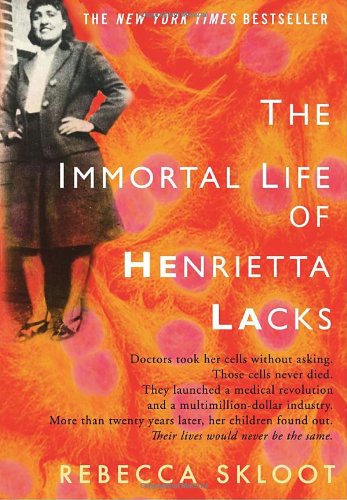
Title: The Immortal Life of Henrietta Lacks
Author: Rebecca Skloot
Paperback: 370 pages
Publisher: Crown Publishing Group (February 2nd, 2010)
Genre: Non-fiction, Science
Read: eBook
Stars: ****/5
Summary: (GoodReads) Her name was Henrietta Lacks, but scientists know her as HeLa. She was a poor Southern tobacco farmer who worked the same land as her slave ancestors, yet her cells—taken without her knowledge—became one of the most important tools in medicine. The first “immortal” human cells grown in culture, they are still alive today, though she has been dead for more than sixty years. If you could pile all HeLa cells ever grown onto a scale, they’d weigh more than 50 million metric tons—as much as a hundred Empire State Buildings. HeLa cells were vital for developing the polio vaccine; uncovered secrets of cancer, viruses, and the atom bomb’s effects; helped lead to important advances like in vitro fertilization, cloning, and gene mapping; and have been bought and sold by the billions.
Yet Henrietta Lacks remains virtually unknown, buried in an unmarked grave.
Now Rebecca Skloot takes us on an extraordinary journey, from the “colored” ward of Johns Hopkins Hospital in the 1950s to stark white laboratories with freezers full of HeLa cells; from Henrietta’s small, dying hometown of Clover, Virginia—a land of wooden slave quarters, faith healings, and voodoo—to East Baltimore today, where her children and grandchildren live and struggle with the legacy of her cells.
Review:
This book has been on my reading-list for a while but I just kept putting it off. I’m glad I got down to it.
The book is about the woman behind the HeLa cells. HeLa cells are the most used cells in research and have contributed hugely to science. They helped with vaccines like polio and research like the method of freezing cells. HeLa was the first cluster of cells to survive and grow in a laboratory; it grew so successfully it is mass-produced. The interesting thing about HeLa cells is that they are cancerous!
These cells and their history is interesting. You can read more here – HeLa on Wikipedia
HeLa cells being interesting as they are I found the story of the person behind the cells and her family more moving. The pathos, the struggle, the love and the bigness they show is heart warming.
The opposites are striking. On one hand HeLa cells get famous and a lot of companies make money. On the other Henrietta’s family don’t even have health care. They don’t know for years how much their mother has contributed to science. They didn’t get their due credit.
Reading the book its clear that Rebecca has spent ages in research. The book is scientific and you’re going to walk away knowing a lot more about cells and cell research but its going to be an interesting read. There is no point at which you get bored. Rebecca has balanced the medical and personal well. I enjoyed the book.
A must read!

0 comments:
Post a Comment